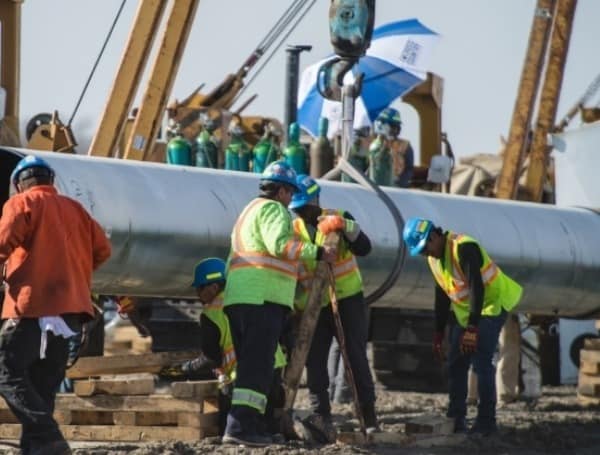Attorney generals (AGs) from California, Oregon, and Washington are calling for the Federal Energy Regulatory Commission (FERC) to stop the expansion of a crucial gas transmission project, arguing that it will violate climate laws; despite the states facing some of the highest gas prices in the country as well as the prospect of blackouts.
California Attorney General Rob Bonta, Washington Attorney General Bob Ferguson and Oregon Attorney General Ellen Rosenblum filed a motion on Monday asking the FERC to deny the proposed capacity expansion of TC PipeLines’ Gas Transmission Northwest (GTN) XPress pipeline project (GTN), according to a press release.
The three western states currently hold some of the highest gas prices in the nation and may be at risk of suffering blackouts.
California possesses the highest national average of $5.3 per gallon, meanwhile, Oregon’s and Washington’s gas price averages sit at $4.80 and $4.70 per gallon, according to AAA data. California may also be at risk of experiencing blackouts as its grid — which is undergoing a green transition — struggles to cope with statewide energy demand as it phases out fossil fuels.
In the news: Florida Cold Case 1984: Woman’s Skull And DNA Used To Create Composite In Hopes Someone Will Recognize Her
“The Gas Transmission Northwest XPress Project (GTNXP) is designed to upgrade our system to meet increased demands from our customers in the region, providing the reliable energy to communities throughout the Western U.S. in a safe, responsible, and reliable manner,” spokesperson from TC Energy told the Daily Caller News Foundation.”The strong demand for natural gas pipeline capacity in the region, which GTNXP will provide, was reaffirmed when GTN secured long-term agreements with customers for 100 percent of the project capacity.”
The GTN pipeline delivers natural gas from the Rocky Mountains and western Canada to the Pacific Northwest and its expansion would upgrade existing natural gas compressor stations in Oregon, Washington and Idaho to increase capacity by about 150 million standard cubic feet per day of gas, according to the FERC’s Environmental Impact Statement draft. TCPipeLines, the pipeline’s operator, claims that the pipeline needs to be expanded to meet the increased energy demand across the western states which the AGs dispute, according to legal documents.
The project could produce emissions up to 204,170 metric tons of carbon dioxide and an additional three million metric tons of carbon dioxide equivalent from downstream emissions, according to the FERC’s environmental analysis.
In the news: Biden Admin To Codify DACA “Dreamers”
The attorney generals assert such carbon emissions will violate their states’ climate change laws, which require cutting greenhouse gas emissions and transitioning to 100% green energy, according to legal filings.
However, the draft found that the expansion would have “minimal detrimental impacts on the environment,” the majority of which would be short-lived.
The West Coast often has elevated fuel costs because the region cannot easily access fuel centers in other parts of the country as the oil market in the eastern U.S. is cut off by the Rocky Mountains.
As such, states like California often rely on foreign energy imports via the Panama Canal; however, the global energy crisis and Russia’s invasion of Ukraine are hiking the prices of all fossil fuels, exacerbating the impact of geographical factors.
The views and opinions expressed in this commentary are those of the author and do not necessarily reflect the opinion of The Free Press.
Visit Tampafp.com for Politics, Tampa Area Local News, Sports, and National Headlines. Support journalism by clicking here to our GiveSendGo or sign up for our free newsletter by clicking here.
Android Users, Click Here To Download The Free Press App And Never Miss A Story. Follow Us On Facebook Here Or Twitter Here.
Copyright 2022 The Free Press, LLC, tampafp.com. All rights reserved. This material may not be published, broadcast, rewritten, or redistributed.

